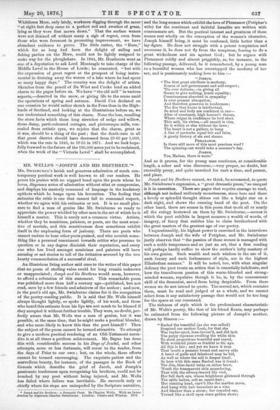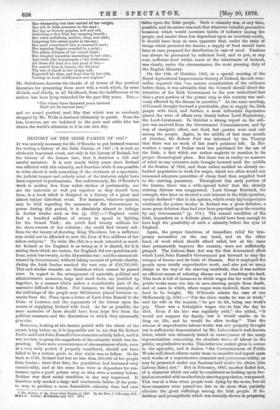MR. WELLS'S "JOSEPH AND HIS BRETHREN."* MR. SWINBURNE'S lavish and
generous admiration of much con- temporary poetical work is well known to all our readers. He pours his praises with no niggard hand upon the poets whom he loves, dispenses notes of admiration without stint or compromise, and displays his masterly command of language in the laudatory epithets which he heaps upon his favourites. The feeling that animates the critic is one that cannot fail to command respect, whether we agree with his estimates or not. It is no small plea- sure to find a man of genius like Mr. Swinburne so ready to appreciate the power wielded by other men in the art of which he is himself a master. This is surely not a common virtue. Artists, whether they be musicians, painters, or poets, are the most sensi- tive of mortals, and this sensitiveness does sometimes exhibit itself in the unpleasing form of jealousy. There are poets who cannot endure to hear other poets praised, and who nourish some- thing like a personal resentment towards critics who presume to question or in any degree diminish their reputation, and every one who has lived amongst musicians and painters will have amusing or sad stories to tell of the irritation aroused by the too hearty commendation of a successful rival.
An illustrious living author said once to the writer of this paper that no poem of sterling value could for long remain unknown .or unappreciated ; Joseph and his Brethren would seem, however, to afford a refutation of this statement. This' remarkable poem was published more than half a century ago—published, but not read, save by a few friends and admirers of the author ; and now, in the poet's old age, Mr. Swinburne claims for it the recognition of the poetry-reading public. It is said that Mr. Wells himself always thought lightly, or spoke lightly, of his work, and those who heard this estimate from his lips are not much to be blamed if they accepted it without further trouble. They were, no doubt, per- fectly aware that Mr. Wells was a man of genius, but it was possible, at the same time, that he might make a poetical blunder, and who more likely to know this than the poet himself ? Then the subject of the poem cannot be termed attractive. To attempt to give a modern poetical rendering of an Old-Testament narra- tive is at all times a perilous achievement. Mr. Bayne has done this with considerable success in his Days of Jezebel, and other attempts, more or less fortunate, will occur to the reader, from the days of Prior to our own ; but, on the whole, these efforts -cannot be termed encouraging. The exquisite pathos and the marvellous beauty, for instance, of the paasages in the Book of -Genesis which describe the grief of Jacob, and Joseph's passionate tenderness upon recognising his brothers, could not be touched by any poet without being injured, and Mr. Wells has failed where failure was inevitable. He succeeds only or chiefly where his steps are unimpeded by the Scripture narrative,
• Joseph and his Brethren: a Dramatic Poem. By Charles Wells. With an Intro- Auction by Algernon Charles Swinburne. London: Chatto and Windus. 1876.
and the long scenes which exhibit the love of Phraxanor (Potiphar's wife) for the continent and faithful Israelite are written with consummate art. But the poetical interest and greatness of these scenes rest wholly on the conception of the woman's character, Joseph himself being, it must be confessed, little better than a lay-figure. He does not struggle with a potent temptation and overcome it, he does not fly from the temptress, fearing to do a great wickedness and sin against God ; but he argues with Phraxanor coldly and almost priggishly, as, for instance, in the following passage, delivered, be it remembered, by a young man to a beautiful woman who has overstepped the modesty of her sex, and is passionately making love to him :—
" JOSEPH.
The first great attribute is modesty, Source of self-government and self-respect; 'Tis ever dolicate,—in giving all Seems to give nothing, hence equality; Consciousness absorbed in sympathy Is ever present abnegation, And therefore generous in tenderness; The fire that burns is intellectual,
So mind and body are combined in one—
Altar of constancy, high honour's throne, Where reigns in confidence its lord elect.
This said, 'tis virtue,—all unsaid is vice, Be it within or else without the laws; The heart is not a gallery, to hang A line of portraits equal fair and false, A gaudy history of sin and shame.
PartAxswoa.
Is there still more of this most precious woof ?
The spinning-out would take a summer's day.
Jossrm
Yes, Madam, there is more."
And so it proves, for the young man continues, at considerable length, a sober and wise discourse,—very proper, no doubt, but execrably prosy, and quite unsuited for such a time, and person, and place.
Joseph and his Brethren cannot, we think, be accounted, to quote Mr. Swinburne's expression, a "great dramatic poem," so unequal is it in execution. There are pages that require nourage to read, although not indeed uniformly monotonous, since here and there a lovely or splendid thought shines out like a bright star on a
dark night, and shows the cunning hand of the poet. On the other hand, there are scenes in this poem that merit all or nearly all the eulogy bestowed on them by Mr. Swinburne,—scenes in which the poet exhibits in largest measure a wealth of words, of imagery, of fancy that entitles him to claim brotherhood with the great masters of the greatest age of our poetry. Unquestionably, his highest power is exercised in the interviews between Joseph and the wife of Potiphar, and Mr. Swinburne justly observes that "the passion of these scenes is managed with such a noble temperance and so just an art, that a first reading will perhaps hardly suffice to show the author's lofty mastery of his own genius. Such wealth and such wisdom in the use of it, such luxury and such forbearance of style, are in the highest Elizabethan manner." It will be noted, too, with what singular delicacy the poet treats an action that is essentially indelicate, and how the tumultuous passion of this warm-blooded and strong- minded woman, repulsive though it be, is, by the consummate skill of the dramatist, saved from being despicable. From these scenes we do not intend to quote. The second act, which contains them, must be read and judged of as a whole, and we cannot select from it any satisfactory passage that would not be too long for the space at our command.
The richness of style which is the predominant characteristic of Mr. Wells's poetry, like that of his friend Keats, may perhaps be estimated from the following picture of Joseph's mother, drawn by Simeon :—
" Rachel the beautiful (as she was called)
Despised our mother Leah, for that she Was tender-eyed, lean-favoued, and did lack The pulpy ripeness swelling the white skin To sleek proportions beautiful and round, With wrinkled joints so fruitful to tin, eye.
All this is fair; and yet we know it true That 'neath a pomane breast and snowy side A heart of guile and falsehood may be hid, As well as where the soil is deeper tinct'.
So here with this same Rachel was it found: The dim, blue-laced veins on either brow, 'Neath the transparent skin meandering, That with the silvery-leaved lily vied, Her full dark eye, whose brightness glistened through The sable lashes, soft as camel-hair; Her slanting head, curv'd like the maiden moon, And hung with hair luxuriant as a vine And blacker than a storm; her rounded ear, Turned like a shell upon some golden shore ;
Her whispering foot that carried all her weight, Nor left its little pressure on the sand; Her lips as drowsy poppies, soft and red, Gathering a dew from her escaping breath ; Her voice melodious, mellow, deep, and clear, Lingering like sweet music in the ear; Her neck o'ersoften'd like to nnsunn'd curd; Her tapering fingers rounded to a point ; The silken softness of her veined hand ; Her dimpled knuckles answering to her chin ; And teeth like honeycombs o' the wilderness; All these did tend to a bad proof in her,— For armed thus in beauty, she did steal The eye of Jacob to her proper self,
Engross'd his time, and kept him by her side, Casting on Leah indifference and neglect."
Mr. Swinburne deserves the thanks of all lovers of fine poetical literature for presenting them anew with a work which, by some ill-luck, and chiefly, in all likelihood, from the indifference of its author, has been lying unheeded for the past fifty years. But,—
" The wheat three thousand years interred Shall yet its harvest bare,"
and no sound poetical seed like that which was so carelessly dropped by Mr. Wells is destined ultimately to perish. None the less, however, are we indebted to the poet and critic who has drawn the world's attention to it in our own day.































 Previous page
Previous page